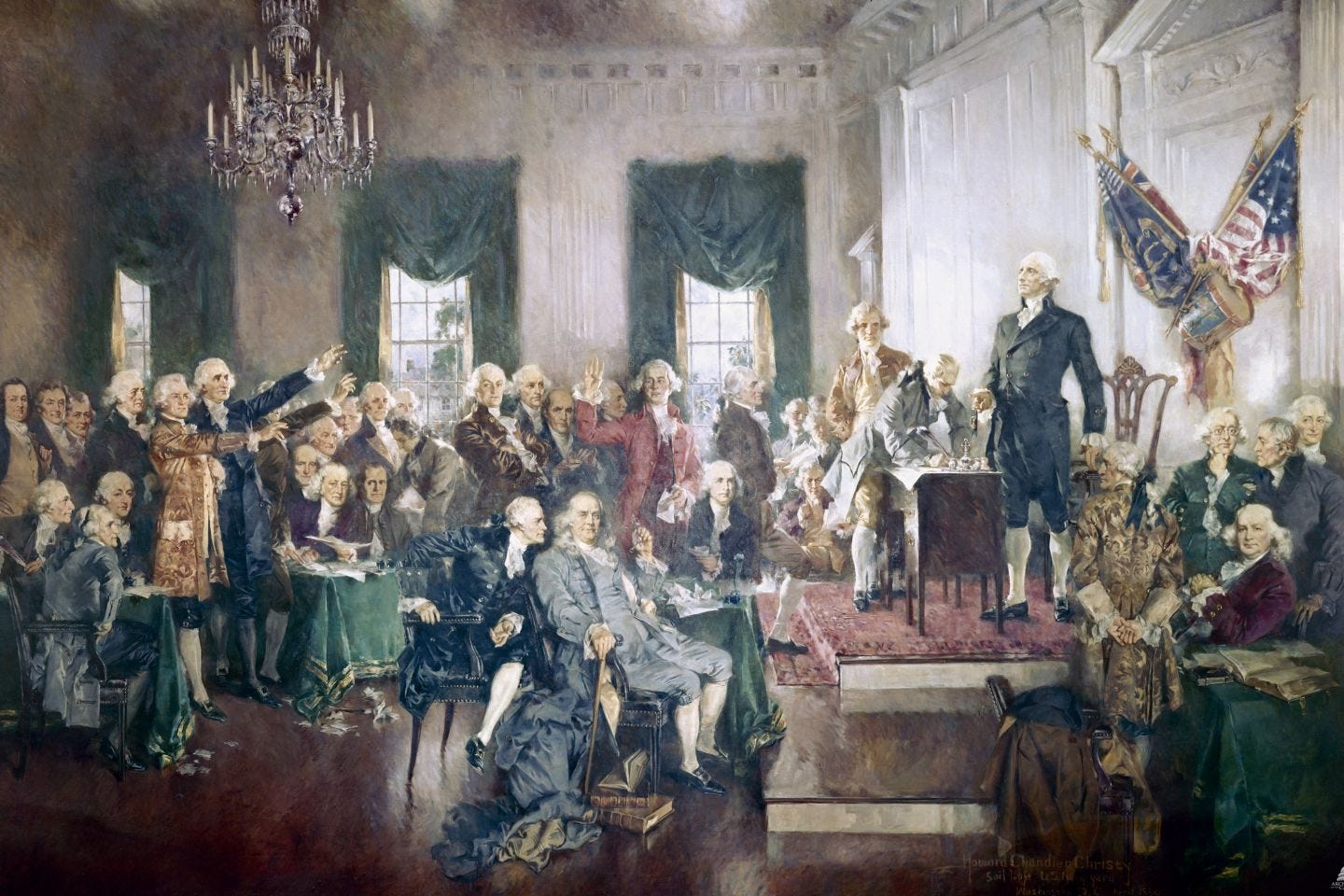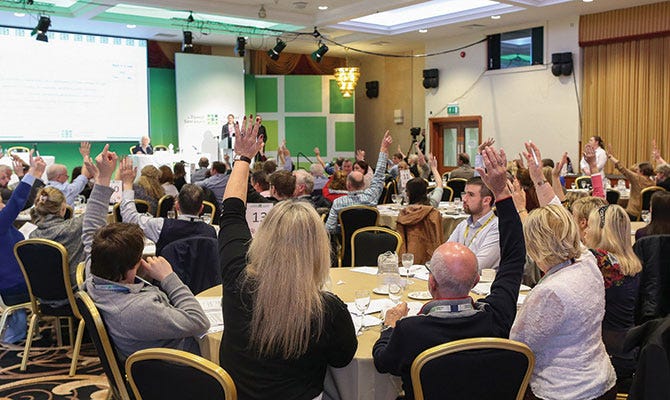To Save America, We Need Democracy by Lottery
The Ancient Solution to Today's Political Problems
Americans are in a political panic. For decades now, Congress has failed to resolve our compounding crises. Many people, exhausted by partisan trench warfare, wish for a charismatic leader to break through the gridlock and impose his will. Observers fear for the health of self-government. Our anxiety is warranted—we must redeem our nation, before we fall apart. But contrary to conventional wisdom, our choices are not limited to embracing autocracy or shoring up a failed status quo. There is another way, a way to allow everyday Americans from all walks of life to come together, listen to each other, and work as one to solve our pressing problems. It’s called democracy. And the road to get there goes through lotteries.
Lotteries? I know—it sounds absurd. After all, most activists, pundits, and leaders—including progressives—assume what we all learned in school: a democracy is a representative government based on elections. Others might add majority rule and robust political parties. If we could just purify the electoral process and eliminate the choke points that throttle the majority, the thinking goes, we’d have a democracy. But is this true? Consider history. Some people are aware that democracy began in ancient Greece, specifically in Athens. Yet most know little about how it was practiced. The Greek word demokratia usually gets translated as “rule by the people.” This raises two questions: who were “the people” and how did they rule?
In Democracy: A Life, Paul Cartledge argues that by ‘people’ the Athenians meant laboring citizens, as opposed to leisured aristocrats. A democracy is a regime controlled by everyday people, not economic elites. The working many, not the wealthy few.1 So much for the who—what about the how? To achieve democracy, Athens practiced two methods. First, participation in the Assembly, the representative body where decisions were made. Any citizen could join these meetings and weigh in on their proceedings. Attendees took turns speaking, and votes were taken by a show of hands. Secondly, the polis utilized democratic lotteries to select representatives for the Council of 500, a smaller group that set the legislative agenda. Lotteries were also used to pick members of juries and fill administrative posts. Citizens served short terms of office and then rotated out.2
What didn’t Athens do? Hold elections. Except for choosing generals, they forbid the use of voting. Why? Because elections do not produce rule by everyday people. Rather, they’re aristocratic devices, used by the upper class to entrench their hold over the body politic. Elections favor well-positioned insiders who have the resources and connections to wage a campaign. They tend to attract power-hungry individuals with narcissistic tendencies, not to mention outright demagogues. Even virtuous candidates are vulnerable to bribes (sorry, “lobbying”). Meanwhile, most voters are woefully uninformed on the issues. If they pay attention at all, they tend to gravitate toward candidates they find “likeable,” instinctively drawn to people who are physically appealing, over confident, and brash. Are these the qualities that make for effective deliberation? Those virtues would include humility, open-mindedness, and a willingness to broker win-win solutions.
Once in office, politicians keep the circus going. They savage the other side, kowtow to their own, and make self-promotional media appearances. The party system exacerbates these problems, encouraging a zero-sum, winner-take-all war instead of serving the common good. Research has proven what we long suspected: politicians mostly do the bidding of plutocrats and special interests. Yes, there are exceptions. Some public officials genuinely want to do right by their constituents. But they face tremendous pressure to assent to activist groups, chase the press, and toe the party line. The Athenians knew these abuses in their time. They employed lotteries to end them. Lotteries cure the pathologies of the electoral system in one fell swoop: gerrymandering, voter suppression, dark money, and more. They circumvent the designs of elites, going straight to everyday people and placing them in power. Aristotle, observing the system, summed it up well in his Politics:
The appointment of magistrates by lot is democratical while the election is oligarchical.
Modern liberal governments, then, are not democracies. And as long as they employ elections, they never will be. We could boast perfect voting rights, universal turnout, and impeccable candidates, and we’d still wind up with a political economy that stifles everyday people. This is by design. With the exception of Thomas Paine, the founders of the American republic deplored democracy and sought to keep the masses out of office, lest they threaten monied interests by passing debtor relief laws and issuing paper currency. These gentry knew about the Athenian system and avoided it, believing (wrongly) that it was a chaotic regime dominated by vice.3 Madison declares his haughty disdain in The Federalist:
Had every Athenian citizen been a Socrates, every Athenian assembly would still have been a mob.
Not surprisingly, when it came to drafting a new form of government, the delegates in 1787 modeled their system on oligarchic Rome, not Athens. Voting would ensure that a “natural aristocracy,” in the words of Jefferson, would rule.4 Historians today admit the many anti-democratic features of the Constitution, but few realize that elections are the chief one. Others claim that while it didn’t start out democratic, the U.S. became so in the 19th century with the rise of mass parties, the end of property requirements to vote, and the enfranchisement of Black men after the Civil War. But while these changes made for improvements, they did not alter the fundamentally oligarchic nature of elections.
The good news is that democracy is mounting a comeback. After lying dormant for centuries, the practice of using lotteries to select everyday people to make decisions is on the rise. Across the West, hundreds of citizens’ assemblies have convened in recent years to exercise political influence. American examples include the Oregon citizens’ assembly organized by Healthy Democracy, and America in One Room. While each is unique, they share a similar process: Through democratic lotteries, a sample of the population is brought together to address one or more issues. Unlike elections, these lotteries give everyone the same chance at selection, which promotes equality. The assembly channels the diverse viewpoints in the public, drawing on the wisdom of crowds. It also reflects the demographic makeup of society. Workers, women, minorities, and the young have better representation.5
Once gathered, members spend days hearing from a range of experts and study in-depth briefing materials. They then deliberate together with the help of facilitators and engage in a civil manner to build common ground. If consensus can’t be reached, votes take place by secret ballot. No games, no gimmicks, no grandstanding. Just honest conversations that foster cooperation and forge the best possible solutions. Citizens’ assemblies encourage people to listen carefully, think slowly, and speak deliberately. They promote long-term decisions that address intractable problems over impulsive Twitter rants.
To date, such assemblies have mostly advised elected legislatures. But a growing group of activists wants this to change. Organizations like the Sortition Foundation in Britain, and of by for* and Democracy Without Elections in the United States, seek to replace politicians with permanent assemblies of everyday people. Scholar and former politician Terry Bouricius even envisions using multiple bodies of citizens chosen by lot to pass legislation. These proposals would raise our country to a level of democracy not seen since the Age of Pericles.
Skeptics raise questions. What if crazy, ignorant, or just plain bad folks get selected? First, citizens’ assemblies combat ignorance through the input of experts and research materials—representatives are much more informed than typical voters and even politicians. As for rotten apples, experience proves that this doesn’t really happen. Most members are balanced, responsible, reasonable people eager to make the process work. While everyone has biases, the facilitators challenge assumptions and promote objectivity. Moreover, if a truly toxic person gets picked, the group has ways to minimize the damage. And the process itself draws out the better angels of our nature.
How would the vast majority of citizens not picked have a voice in the decision making process? On this score, citizens’ assemblies can be designed to allow petitions, proposals, and questions from the public at large. Furthermore, with frequent rotation and assemblies at all levels of government, many more people would get to serve than ever before. In two and half centuries, only 11,107 Americans have ever served in Congress. Just one hundred and fifteen have sat on the Supreme Court. This is out of a population of hundreds of millions. With democracy by lottery, we could eclipse those numbers in a few years. Finally, the key to remember is that, because of the science of lotteries, citizens’ assemblies reflect the views of the public much better than elected chambers—even though we all can’t be in the room where it happens, it’s as if we are.
What about the competence it takes to run the government and administer policy? Remember: we’re talking primarily about legislative assemblies that pass laws, not executive departments that implement them. The characteristics that make for good legislators—personal values, team work, a strong moral compass—come from the life experience we all share. And compared to Athens, we’re a highly educated society. Ninety percent of Americans have a high school diploma. Thirty-five percent graduated from college. Executive departments, it’s true, do require training, skill, and expertise to manage effectively. But here, too, citizens’ assemblies can improve on our current system: panels of citizens, selected by lottery, could come together to research and vet candidates for civil offices. Free of party allegiance, they could choose cabinet secretaries, diplomats, and judges based on actual merit—not ideology or donor status. The best and the brightest could be placed in a pool and a second lottery employed to choose the winner, ensuring no one could corrupt the outcome. In fact, we might even choose the President this way.
These are just a few objections—there are more. Most can be addressed. But don’t get me wrong. Democracy by lottery wouldn’t be foolproof, nor usher in utopia. Athens still had its problems, and so would we. The same corrupting forces that poison Congress—giant corporations, media propaganda, special interests—would try to distort citizens’ assemblies. Factions might emerge among the selected members, replicating the party system. Bureaucrats, staff, and wonks, convinced of their technocratic superiority, could try to overawe the everyday people in office. The system would require strong ethics laws, strict oversight, and the ability to self-correct. Yet however imperfect, it would be an improvement. And for every potential pitfall, just look at Congress and your state legislature and ask yourself one question: could it possibly be worse?
How to bring such a democracy about remains an open question, especially in a regime as closed, captured, and ossified as ours. Some people think citizens’ assemblies could gradually strip authority from elected politicians until the latter become figureheads. But I’m doubtful. We’re talking about completely replacing the regnant regime. The monarchs of Europe (if they didn’t lose their heads) relinquished power mostly in the face of revolutions. And the deepest changes to the U.S. Constitution—the 13th, 14th, and 15th Amendments—took place only through a catastrophic civil war that claimed a million lives and destroyed the ruling class of the South. What’s more, we don’t really have time to wait and see—our crises are mounting and the country is on the brink.
In my view, implementing a full-blown democracy will require a mass movement on the scale of the Arab Spring—something bigger than the Tea Party, Occupy Wall Street, the Women’s March, and the Black Lives Matter protests put together. In other words, a general strike of the American people. This non-violent, populist protest could convene its own constitutional convention and demand the implementation of democracy by lottery. Sound crazy? Maybe not. Prof. Akhil Amar of Yale, one of the foremost authorities on the Constitution, argues that the people have the right to abolish the government through direct popular sovereignty. In other words, we’re not bound by the byzantine rules of Article V to hold a convention. A majority of Americans could gather together, deliberate as a body, and create a new government based on democracy by lottery.
There is precedent for such an action: the first constitutional convention itself. The convention of 1787 was an extra-legal gathering—the Articles of Confederation didn’t provide for such a meeting. The delegates were given special permission to gather, with a mandate to offer modifications to the current government, not structural changes. But once convened, they promptly exceeded their authority by proposing an entirely new constitution, which they debated behind closed doors with no members of the public even present to watch. They went on to convene extraordinary ratifying conventions in order to circumvent the existing state legislatures and railroad their new national government into existence. No one gave them this authority—they just claimed it for themselves.6
So might we. Except this time, it must be a truly democratic movement of the people, instead of a bloodless coup by fifty-five aristocrats. Could Americans of all persuasions—liberals and conservatives, libertarians and socialists, independents and moderates and more—come together and throw the bums out for good? Perhaps. Sixty-five percent of the public say our government needs major changes or complete reform. And citizens’ assemblies are wildly popular. Most Americans believe that if we could just clear the room of partisan pols, fat cat donors, and media spin doctors, everyday people could forge agreements that we could all live with.
In the midst of the Civil War, Abraham Lincoln—a great democrat—leveled with the American people:
The dogmas of the quiet past are inadequate to the stormy present. The occasion is piled high with difficulty and we must rise with the occasion. As our case is new, we must think anew and act anew. We must disenthrall ourselves, and then we shall save our country.
We must also think anew. We must disabuse ourselves of perhaps the dustiest dogma of all: that elections yield democracy. At Gettysburg, the 16th President urged us to dedicate ourselves to ensuring that government of the people, by the people, for the people shall not perish from the earth. Today, the question is not whether we will let democracy in America die, but whether we shall let it finally be born.7
Paul Cartledge, Democracy: A Life (New York: Oxford University Press, 2016), 1-3.
Mogens Hansen, The Athenian Democracy in the Age of Demosthenes: Structure, Principles, and Ideology (Oxford: Blackwell Publishers, 1991).
Michael J. Klarman, The Framers’ Coup: The Making of the United States Constitution (Oxford: Oxford Univerisity Press, 2016), 242-246.
Carl J. Richard, Greeks and Romans Bearing Gifts (Lanham, MD: Rowman & Littlefield Publishers, 2008).
Helene Landemore, Democratic Reason: Politics, Collective Intelligence, and the Rule of the Many (Princeton: Princeton University Press, 2013).
See Klarman, The Framers’ Coup.
Democracy by Lottery Resources
Videos
Podcasts
“Terry Bouricius on Democracy,” The Similitude
“Democracy Without Politicians,” How To Citizen
Blogs
Articles
Organizations
Books
General
The Keys to Democracy: Sortition as a New Model for Citizen Power (2023) by Maurice Pope
The Government of Chance: Sortition and Democracy from Athens to the Present (2023) by Yves Sintomer
Against Elections: The Case for Democracy (2018) by David Van Reybrouck
Democracy: A Life (2018) by Paul Cartledge
The End of Politicians: Time for a Real Democracy (2017) by Brett Hennig
Theory
Demopolis: Democracy Before Liberalism in Theory and Practice (2017) by Josiah Ober
Open Democracy: Reinventing Popular Rule for the Twenty-First Century (2020) by Helene Landemore
Democratic Reason: Politics, Collective Intelligence, and the Rule of the Many (2017) by Helene Landemore
Sortition and Democracy: History, Tools, Theories (2020) ed. Liliane Lopez-Rabatel and Yves Sintomer
Foundations and Frontiers of Deliberative Governance (2012) by John Dryzek
Athenian Democracy
Athenian Democracy in the Age of Demosthenes: Structure, Principles, and Ideology (1999) by Mogens Herman Hansen
The Rise and Fall of Classical Greece (2016) by Josiah Ober
Democracy and Knowledge: Innovation and Learning in Classical Athens (2010) by Josiah Ober
Athenian Legacies: Essays on the Politics of Going On Together (2007) by Josiah Ober
The Athenian Revolution: Essays on Ancient Greek Democracy and Political Theory (1998) by Josiah Ober
Mass and Elite in Democratic Athens: Rhetoric, Ideology, and the Power of the People (1991) by Josiah Ober
Origins of Democracy in Ancient Greece (2008) ed. Josiah Ober
Demokratia: A Conversation on Democracies, Ancient and Modern (1996) ed. Josiah Ober
Athenian Political Thought and the Reconstitution of American Democracy (1994) ed. Josiah Ober
Contemporary Designs
“Democracy Through Multi-Body Sortition: Athenian Lessons for the Modern Day,” (2013) by Terrill Bouricius, The Journal of Deliberative Democracy
Legislature by Lot: Transformative Designs for Deliberative Governance (2019) ed. John Gastil and Erik Olin Wright
Democracy in Crisis: Lessons from Ancient Athens (2022) by Jeff Miller
Rebooting Democracy: A Citizen’s Guide to Reinventing Politics (2014) by Manuel Arriaga
The Political Potential of Sortition: A study of the random selection of citizens for public office (2009) by Oliver Dowlen
A People's Parliament/A Citizen Legislature (2008) by Keith Sunderland
Saving Democracy: A Plan for Real Representation in America (2006) by Kevin O’Leary
Deliberative Democracy in America: A Proposal for a Popular Branch of Government (2004) by Ethan Leib
A Citizens’ Legislature (1985) by Ernest Callenbach and Michael Phillips








Love it, especially the last line: "Today, the question is not whether we will let democracy in America die, but whether we shall let it finally be born." Sortition isn't a panacea, as you note. We still need wider, everyday practice of democracy in families, workplaces, civic assoc, etc. to nurture citizens best prepared for sortition. That said, sortition would be a giant leap forward in democracy.
Very convincing. However, you lost me at the idea of a populist convention. Such an idea could easily be co-opted by alt-right groups and further erode trust in what little competent government we have.